In my first 6 months of blogging I tried everything.
But nothing moved the needle on my traffic.
I played around with SEO, using whatever free keyword tools I could find.
And then I finally bit the bullet and got a paid subscription to KWFinder.
For the first time in my six month blogging career, my traffic started steadily growing. My traffic tripled in a period of just 3 weeks:
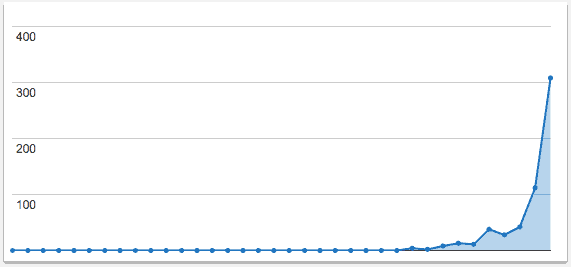
In this article I’m going to show you how to rank on Page#1 of Google for long tail keywords using the KWFinder Tool.
But before I do that, a quick word about long tail keywords.
Why Use Long Tail Keywords?
As a beginning blogger, the biggest mistake I made was this:
I spent hours, even days, writing blog posts that were well researched, well written, and were 2,500 to 4,000 words in length.
But they were blog posts that could never get ranked on Google.
Why?
Because they were targeting keywords that were simply too competitive.
Keywords like ‘email marketing’ or ‘content marketing’.
These are ‘Head’ keywords (keywords comprising 1 or 2 words) and they have a huge volume of monthly search traffic and insane levels of competition.
Unless you have a Domain Authority of at least 40, you simply cannot get ranked on Page #1 of the Google Search results for these kinds of keywords.
How To Get Your Blog Post on Page #1 of Google
To get your blog post on Page #1 of Google, you need to target long tail keywords.
These are keywords containing a minimum of 3 words.
They typically have relatively low monthly search volume (50 – 200 searches per month).
But the competition for them is also low.
Why?
Because the big websites can’t be bothered with them – it’s not worth their while.
Thousands of Page Views a Month
When you put enough of these long tail keywords together, it amounts to thousands of page views a month.
And that’s how many successful bloggers built their traffic.
But how do you find these long tail keywords?
Google Keyword Planner
You used to be able to find them in the Google Keyword Planner.
But you can’t anymore.
In late 2016 Google decided that the Keyword Planner would only be available to people with a paid subscription to Ad Words.
But not only that…
Google also stopped showing exact monthly search volumes for keywords in the Keyword Planner.
What they show you now is a range of monthly search volume for each keyword, such as ‘100 – 1K’:
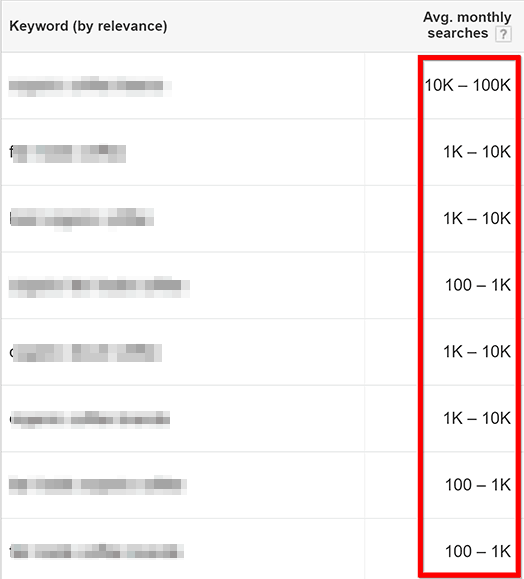
That’s simply too vague to use as a basis for finding long tail keywords for your blog posts.
So what’s the solution?
You need a keyword research tool.
You’ve probably heard of some of them:
- SEMrush
- Ahrefs
- LongTailPro
- SpyFU
- Moz KW Difficulty Tool
- SERPWoo
- SEOcockpit
- Keyword Tool.io
Enter the KWFinder Tool
One of the new players in this field is KWFinder Tool.
And I’m very excited about it…as you’ll see!
The User Interface of KWFinder Tool is simple, clean, easy to use and easy to understand.
How to find long tail keywords with KWFinder
I’m going to give you a quick demo of how to find long tail keywords using KWFinder.
I’ll show you how to use KWFinder to find long tail keywords that you can rank for on Page #1 of Google.
Are you ready?
Let’s dive in:
KWFinder consists of three components:
- KW Finder itself
- SERPChecker
- SERPWatcher
In this tutorial, I’m going to focus on KWFinder because it’s the core of this tool.
When you open KWFinder you see a window with two panels:
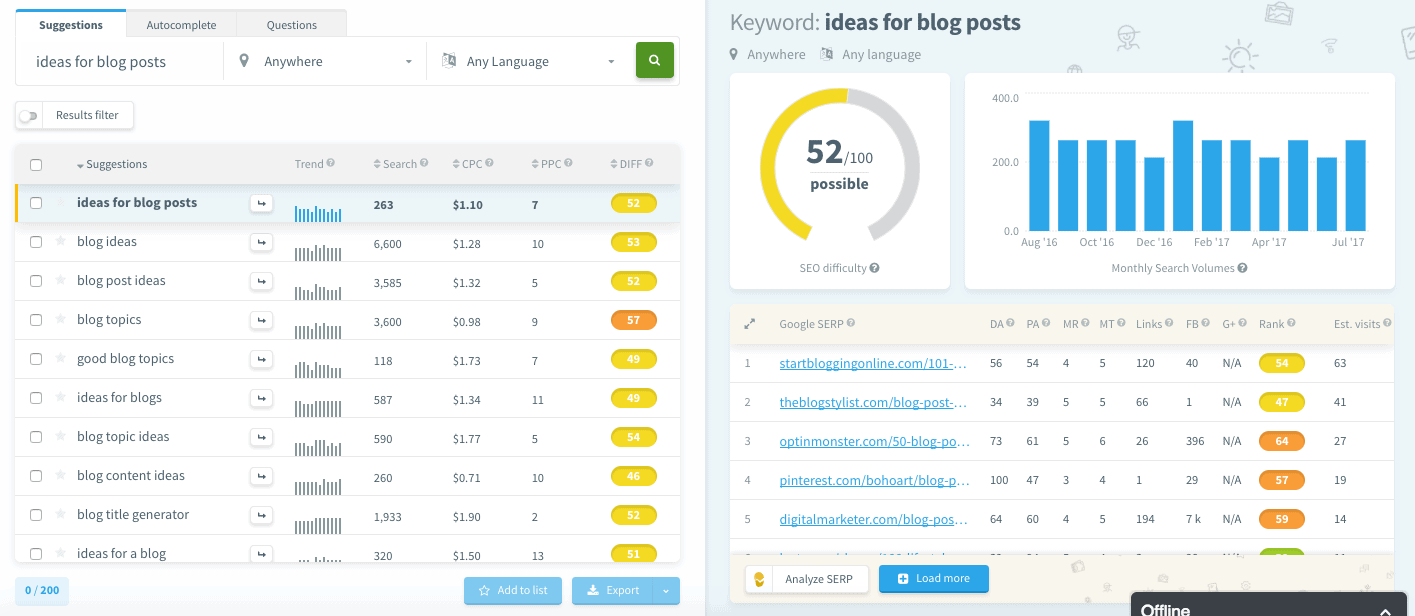
The left panel is the Keyword Finder itself.
This is where you enter your seed word and where you see the results of your search.
The right panel shows the SERP Results…
…where you see the top 10 websites that rank for that keyword in Google.
(More about the SERP results panel later).
Let’s focus on the Keyword Finder itself:
Type in your seed word in the box and click search.
Let’s say I run a Lifestyle Blog. I’m thinking of writing a blog post on ‘blog post ideas’.
I type that in as my seed word:
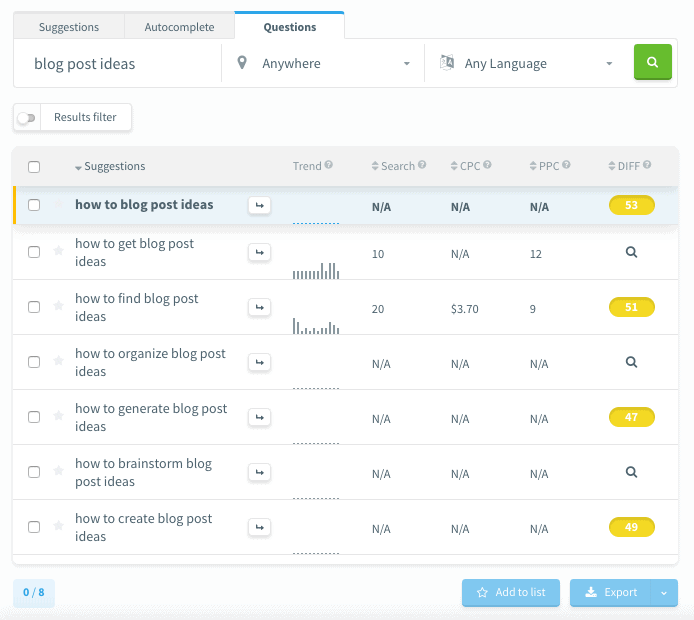
KWFinder Tool then populates the left panel with results for your search.
In the left panel you’ll see 5 columns of metrics for each of the suggested keywords:
- Trend over the last 12 months
- Average monthly search volume
- Average Cost per Click (CPC)
- Average competition in Pay Per Click (PPC)
- Keyword SEO Difficulty
The ones that interest me are (2) and (5).
I want to know that the average monthly search volume is at least 50 and I want to see a Keyword SEO Difficulty Score of no more than 39.
Keyword SEO difficulty is ranked on a scale of 0 – 100, in the following brackets of difficulty:
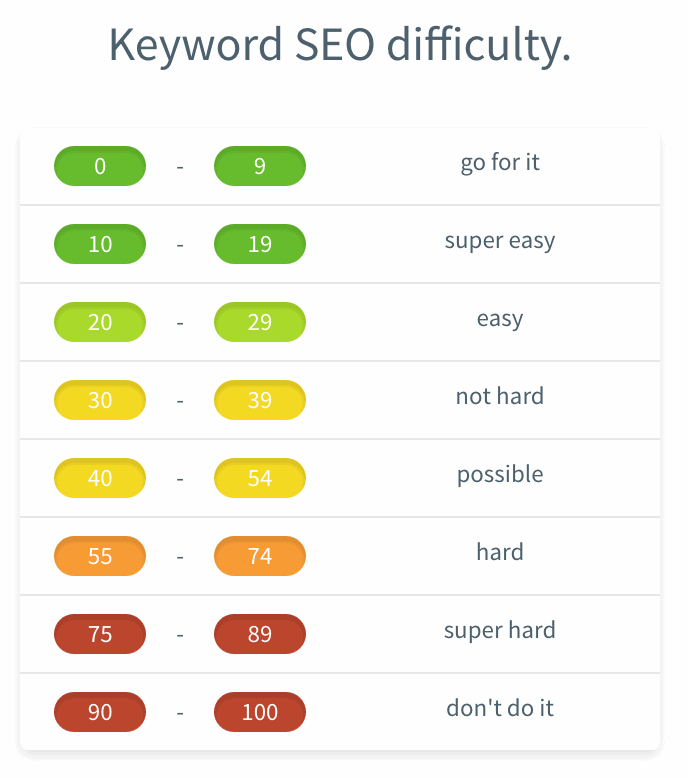
I don’t bother with anything above 39.
That’s because I have a domain authority of 21 – I’m guessing I’d need a DA of over 30 to rank for keywords with a score of 40 and above.
In the right panel KWFinder displays the Difficulty Score for the first keyword in the list:
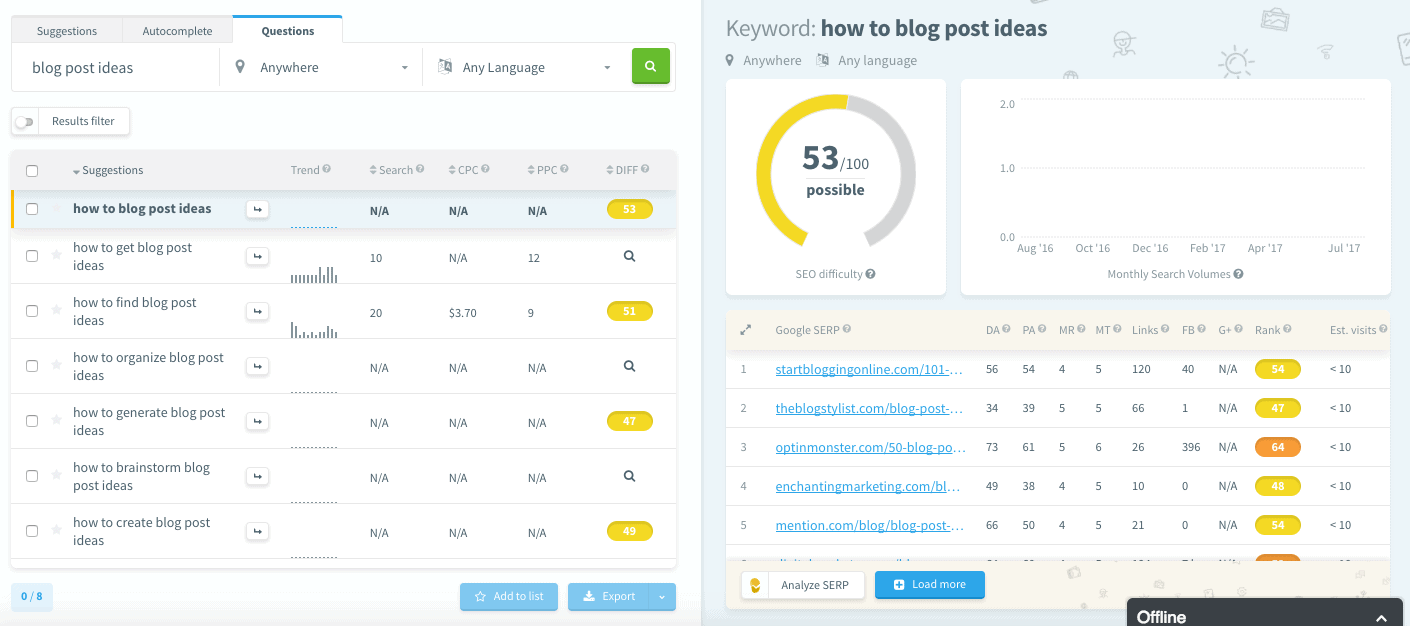
In the left panel the key metric is the far right column – the ‘Difficulty Score’.
Click on the arrow next to that label and order the results from low to high:

You can now see a bunch of ‘green’ results (i.e. in the range from 0 to 29 difficulty).
One in particular looks good: ‘lifestyle blog ideas’:
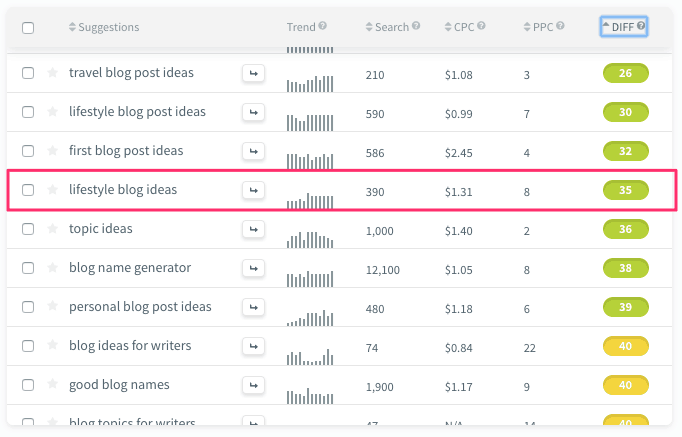
It has good average monthly search volume (390) and the SEO difficulty is within my range (35).
Use KWFinder’s SERPchecker to view the competition
Click on that keyword and in right side panel you’ll cansee the top 10 websites that rank in Google for that keyword.
You can see that in Position #8 there’s a website with a domain authority of only 20.
With a DA of 21 you should be able to rank on Page #1 of Google for this keyword.
So click on the ‘Add To List’ button at the bottom of the page:
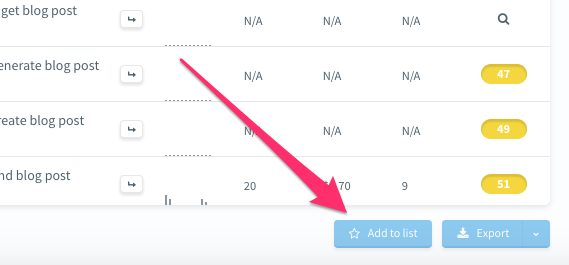
If you don’t already have a list, KWFinder will ask you to create one.
Otherwise, it will simply add that keyword, together with all its metrics, to your existing list.
And that’s it!
You now need to go and write your blog post, targeting the keyword ‘lifestyle blog ideas’.
Track your new keyword in SERPWatcher
Once your blog post is live, you’ll want to set up SERP Tracking so you can see if your blog post is rising or falling in the search results.
This is hugely important in any SEO campaign.
Why?
Because you can’t just target a promising long tail keyword and then sit back as if your job is over.
You need to monitor how your page is ranking.
Is it going up? Or is it going down?
If it’s going down or if it’s not moving up, you’ll need to make some On-Page SEO adjustments.
So, how do you track the performance of your web page?
Click on the small downward arrow next to KWFinder and in the dropdown menu, click on SERPWatcher:
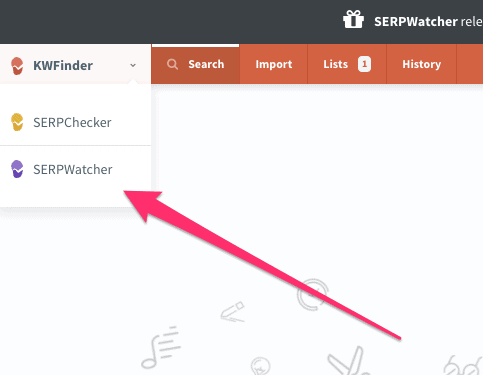
On the next screen click on ‘Create First Tracking’:
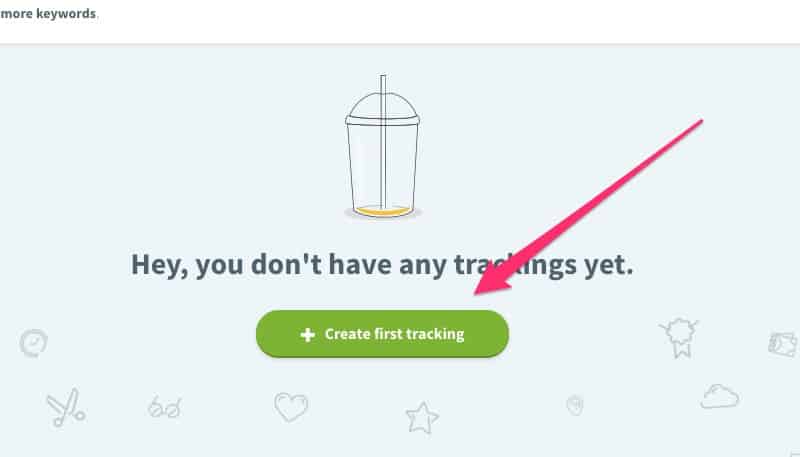
Because this is your first SERP tracking, you’ll need to enter your website URL. Then enter the keyword you want to track in the SERPs:
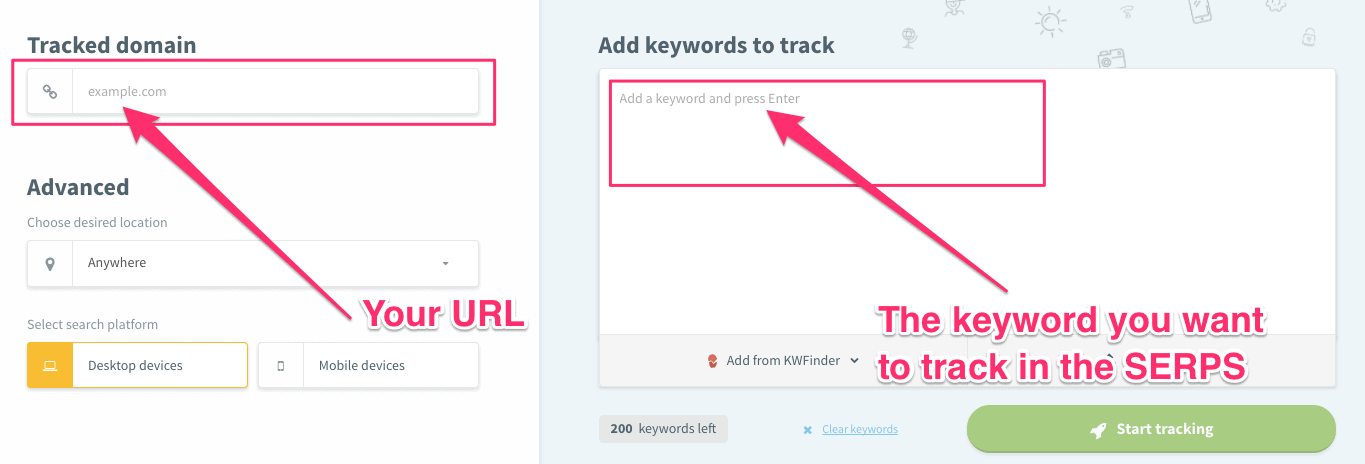
How does KWFinder Tool Compare?
The User Interface of KWFinder is far more intuitive and user-friendly than anything I’ve seen in any other Keyword Research tool.
I love the fact that I can see the key metrics for my potential keywords on the left screen and in the right screen I can see the websites that are currently ranking on Page #1 of Google for that exact keyword, together will all the relevant metrics (such as DA, number of links etc).
That means I can make a quick decision as to whether I’m going to target a given keyword, all on the one screen.
KWFinder is not as advanced as some of the other tools. For example, it doesn’t offer a Competitor Analysis tool (that’s where you can see exactly what keywords your competitors are ranking for).
But if you’re starting out in Keyword Research and don’t want to get overwhelmed with data, then KWFinder is ideal.
After all, what’s the use of having all those extra data points if you don’t know how to use them?
Again, it comes back to how easy it is to quickly find those golden long tail keywords.
Another consideration is price.
The other keyword research tools are considerably more expensive than the KWFinder Tool.
These are the cheapest plans for the other keyword research tools (on a monthly billing cycle):
- SEMrush – $99 p/month
- Ahrefs – $99 p/month
- Moz Pro – $99 p/month
- Keyword Tool.io – $68 p/month
- SERPWoo – $49.95 p/month
- SEOcockpit – $40 p/month
- SpyFU – $39 p/month
- LongTailPro – $37 p/month
- MarketSamurai – one-time fee of $149
Bear in mind that some of the above plans only give you10 keyword lookups per day (KWFinder gives you 100 a day).
When I wrote this article KWFinder Tool was $29 p/month.
However, it recently went up to $49 p/month (though if you buy the annual plan it’s still works out at $29 p/month).
Even at the new price, it’s still good value. It gets results and that’s the main thing!
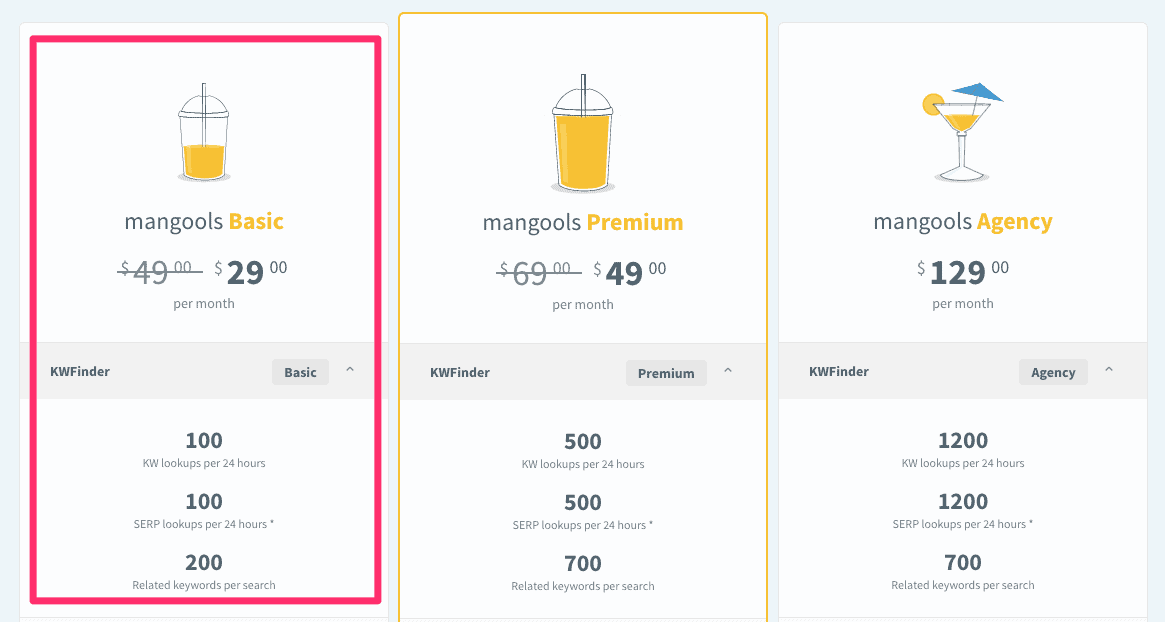
The Basic Plan for KWFinder gives you a whopping 100 KW lookups per day…more than enough to keep you busy (and much more than offered by some of the other basic plans listed above).
This is an excellent entry-level keyword research tool.
It’s great for beginners as it has the cleanest, most intuitive and easy-to-use UI of any keyword research tool currently on the market.
Thank you very much for your tutorial, As an SEO newbie, Also Not good at English,Tutorial easy to understand.
Hi Shaw, thanks for dropping by and for your comment. I’m glad it was useful. All the best, Rob.
I’ve been using keyword finder for quite some time now and I love it. It is much more intuitive as you said and many of the other tools in some of the other platforms I don’t use anyway. I just want to know the volume and if I can rank.
Great article! I track stuff on a spreadsheet but I didn’t realize there was a list and I rarely look at the SERPs so I’ll have to start looking to see the DA of the sites I’m considering competing with.
Rob,
I’ve been using keyword finder for quite some time now and I love it. It is much more intuitive as you said and many of the other tools in some of the other platforms I don’t use anyway. I just want to know the volume and if I can rank.
Great article! I track stuff on a spreadsheet but I didn’t realize there was a list and I rarely look at the SERPs so I’ll have to start looking to see the DA of the sites I’m considering competing with.
Hi Jason,
Thanks for stopping by and thanks for your comment! I’m glad you found the article useful.
Regarding the DA scores in the SERPs: for me, that’s more important than the Keyword Difficulty (KD) score that KWFinder assigns to each keyword. The KD score can be 15 to 29 (‘still easy’) but if the DA scores in the SERPs are all 5 points higher than my DA, I don’t even attempt it.
All the best 🙂
Rob
Great article Rob .It helped me know about new things about KW finder.I have spend many days to rank my website but it seems to be hard .I have decided to quit .But your post made some hope in my life.Thanks.
Hi Rob,
Glad to know that your traffic is increasing.
I have used Kwfinder and this is one of the best available in the market, i specially like their difficulty score which better much better accurate than the other tools.
Hi Doug,
Thanks for your comment. I agree – KWFinder is great! I love the user interface, v. easy to use. However, I often find the Keyword Difficulty scores don’t really reflect how easy or hard it is to get ranked on Page #1 for a given keyword. A much better guide, I find, is the DA of the sites listed in the SERPs for that keyword. If I see a web page with DA close to mine, I know I have a good chance of getting on Page #1.
Best, Rob.
Rob,
I’m fairly new and I used a trial of a couple of keyword research tools and I found their difficulty just didn’t line up with my results. Does KWFinder show the DA and PA within the tool or are you using a browser extension to see them to look at them that way?
Slightly off topic, but how are you tracking your rank of your keywords? I realize no matter what tool you have to take it with a grain of salt but searching on my computer the rank looked great but in reality no traffic for many keywords. I’ve been looking around for ideally a free checker or at least not like $100/month. Just a little bit ago I found over on https://thinkbigreview.com/4-great-websites-to-get-your-true-keywords-ranking-in-google/ and in the list the free checkers were I think more accurate than my browser but even those have some fluctation.
Is there a tool you know in beta or at least free to try even if i have to retype in my keywords each time just so it can help me get a start and then later on purchase something? I’d rather invest the money in a keyword research tool obviously but I can’t do beyond cost of KWFinder until traffic picks up some.
Thanks and again nice writeup Rob. Your writing is just easy to read and follow and I really like that.
Hi John,
Thanks for your question.
The keyword difficulty scores used by the various keyword research tools can be quite unreliable as predictors of how easy/hard it will be to rank for a given keyword. They also give wildly different results for the same keyword. For example, SEMrush used to give much harder scores than KWFinder for the same keyword (though KWFinder has since re-calibrated its keyword difficulty score).
I have found the best predictors of whether I can get on Page #1 for a given keyword are (1) the DA of the pages that rank on Page #1 (if there is a DA close to my own, then I know I have a good chance) and (2) the quality of the content on the top-ranking pages (if the quality is thin, then I know I have a very good chance of ranking high for that keyword).
Regarding the DA and PA in KWFinder, these values are shown in the SERPs panel for each keyword:
To be honest with you, I don’t go into great detail when tracking my keyword position. As long as my organic traffic is on the rise, week-on-week, I’m happy. KWFinder does provide a metric (“Dominance Index”) that records your overall keyword position and shows whether it’s rising or falling:
But I think you’re looking for something more detailed than that.
Robbie Richards did a survey on this and SEMrush and Ahrefs came out as the best keyword rank trackers: https://www.robbierichards.com/seo/best-rank-tracker/.
Accuranker seems like one the best Google position checker tools and it has a 14-day free trial: https://www.shoutmeloud.com/5-excellent-websites-to-check-keyword-ranking-in-google.html
I hope this helps 🙂
Rob.
Thanks for the quick reply Rob.
I do see what you mean in that it’s not necessarily the exact ranking but that you’re getting the traffic. After all, search traffic for given terms is going to fluctuate.
I think once you have good traffic than you don’t have to look at rankings to feel like you’re making progress 🙂 The Dominance Index looks to be pretty handy too to ensure things are going in the right direction.
I’m going to check out KWFinder since it has a nice look and seems like it works pretty well. I’ve noticed that not all have the CF and TF from Majestic. I know it’s not as good of a measure as the DA and PA from Moz, but do you find looking at the Majestic numbers adds much to your decisions or just a nice secondary statistic?
Hi John,
Thanks for your reply. I haven’t used Citation Flow and Trust Flow much – I’ve always leaned towards the Moz metrics. So I can’t really comment on the Majestic metrics. DA seems to be more widely used as a measure of a site’s link profile.
Best,
Rob
Hi Alyce,
Thanks for your question. To be honest, I don’t have much experience with the ahrefs tool. I find that all of the keyword difficulty scores that I’ve seen and used are fairly arbitrary and can only be used as a very rough guide. There are 2 factors that, in my experience, are a much better predictor of whether or not you will be able to rank on Page #1 of Google for a given keyword:
Factor #1: if there is a web page ranking for that keyword that has a domain authority (DA) no more than 5 DA points higher than your own DA, then you have a good chance of ranking for that keyword.
Factor #2: look carefully at the content in the first five results. If that content is ‘thin’ or is slightly ‘off-topic’, then you would have a good chance of ranking for that keyword (all you would need to do is write content that is more comprehensive or addresses the search query more directly).
Hope this helps – Rob